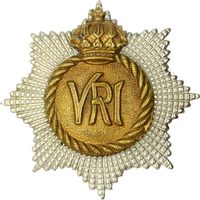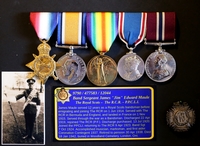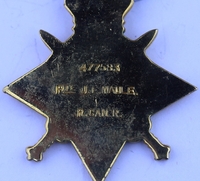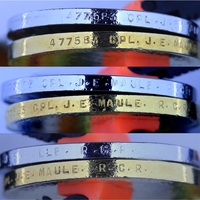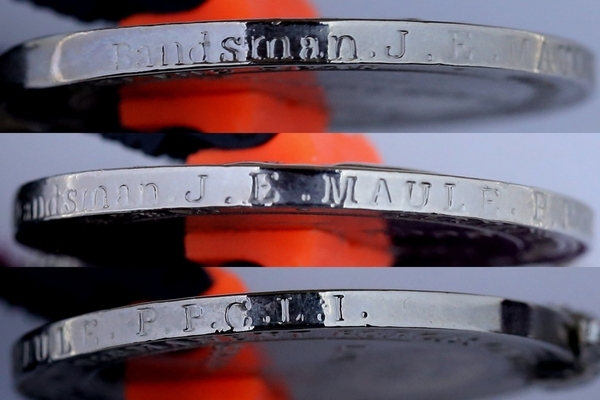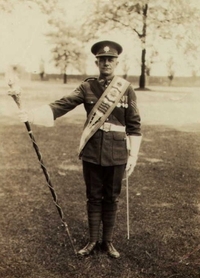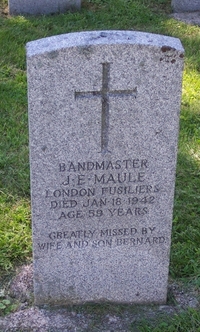
9790 / 477583 / 12044 Sergeant James Edward Maule
The Royal Scots
The Royal Canadian Regiment
Princess Patricia's Canadian Light Infantry
The Canadian Fusiliers (City of London Regiment) (M.G.)
By: Capt (ret'd) Michael M. O'Leary, CD, The RCR
James Edward Maule was born in Belfast, Antrim, U.K., on 10 Jan 1883. Maule's family can be found in the 1891 England census. Parents James (31) and Ellen (32) are shown with five children; James Edward (8) is the eldest, followed by Sidney (6), Mary (4), William (2), and Joseph (1). The family would welcome 12 more siblings, though not all would survive childhood, with the youngest brother Donald being born in 1915. The family moved to Bristol, Gloucestershire, England, soon after James Edward's birth, and all later births in the family are shown (in the collected data on the family in ancestry.ca) to have occurred in or near that town.
The England census of 1901 shows that Maule had already left the family home. Working as a plasterer in 1901, he is shown to be residing as a boarder in the home of George and Mary Budd of Bristol.
Soon after the 1901 census was taken, James Maule enlisted in the British Army on 1 Oct 1901. On enrolling with The Royal Scots, he would be given the regimental number 7745. Maule would serve 12 years as a bandsman with the Regiment, initially with the 1st Battalion in England and in late 1908 or early 1909 he proceeded overseas to join the 2nd Battalion at Poona, India.
Before he left England, 25-year-old James married Ethel Tyler at Elhem, Kent, Eng., on 24 Nov 1908. Less than a year later, on 8 Sep 1909, the Maule's would have a son, Bernard James Edward Maule. By the time of the birth of their only child, Maule would be on foreign service at Ranikhet, a hill station in Uttarakhand State, northern India.
The 2nd Bn., The Royal Scots, moved to Bombay in 1909 and returned to England in 1912. The following year, on 3 Nov 1913 Maule was discharged from the British Army after twelve years service.
On 30 May 1914, James, Ethel, and Bernard Maule arrived in Halifax aboard the S.S. Carthaginian, a steamship of the Allan Line. Launched in 1884, the Carthaginian made many crossings between Liverpool, England, and Halifax and Quebec in Canada before the First World War. Over the years the Carthaginian would bring over 2000 British Home Children to Canada, and 96 of these were on the same sailing with the Maule family. The passenger list for the vessel showed Maule's employment before leaving England as a "Collector for Friendly Society," and his intended employment in Canada was to join the army.
Two days after arriving in Halifax, on 1 Jun 1914, Maule enlisted in the Canadian Permanent Force with The Royal Canadian Regiment. At age 31, Maule was described on enrollment as 5 feet 7 inches in height, weighing 136 pounds, with a 37 inch chest, a light complexion, grey eyes, and brown hair. For identifying marks, he had a scar on the middle finger of his right hand. Maule gave his religious denomination as Church of England. On attesting with The RCR, Maule was given the regimental number 9790.
On 11 Sep 1914, The Royal Canadian Regiment sailed for Bermuda where they would serve for a year on garrison duty. The Regiment relieved the 2nd Battalion, Lincolnshire Regiment, which sailed immediately for England. Bandsman Maule is shown on the regimental roll for the unit in Bermuda in November, 1914. The address of his next of kin is shown as Wellington Barracks in Halifax, they were not one of the over 30 spouses or families who accompanied regimental members to the island.
The RCR was relieved in turn by the arrival of the 38th Overseas Battalion from Canada on 12 Aug 1915. The Regiment immediately returned to Halifax for a stay of only a week during which all members were re-attested for overseas service. Although The RCR had just spent a year in Bermuda, there were concerns regarding the applicability of the soldiers' Permanent Force enlistments for wartime deployments. This was, perhaps, prompted by the idea that a man on a P.F. three-year engagement could choose not to re-engage and the Government would be obligated to bring him home. Enlistment in the C.E.F., on the other hand, was for the "Duration of War." Accordingly, the soldiers of The RCR were re-attested, signing C.E.F. attestation papers in August 1915 before sailing for Europe.
Maule attested for service in the Canadian Expeditionary Force (C.E.F.) with The RCR at Halifax, N.S., on 22 Aug 1915. A 32-year-old musician, Maule identified his wife, Mrs. J.E. Maule, 82 East Young St., Halifax, N.S., as his next of kin. His attestation paper recorded his 12 years prior service with The Royal Scots.
On 26 Aug 1915, The RCR sailed from Halifax aboard the S.S. Caledonian, the same ship that had brought them home from Bermuda. On the roll for "A" Company, Maule received allowances in lieu of lodgings, rations, fuel and light from 26 Aug 1915, indicating that his family vacated married quarters before the Regiment left Halifax for England. This allowance, $25 per month, was paid to offset accommodations and provisions he would be entitled to if his family occupied married quarters.
Commencing September, 1915, Maule established a monthly Pay Assignment of $48 to be sent to his wife. As a Private in the C.E.F., Maule was paid $1.00 per day plus an additional ten cents daily field allowance. In addition to this, the $25 per month Permanent Force Allowance was also deposited to Maule's pay account. The portion of his pay assignment which came from his soldier's pay represented over two-thirds of his monthly pay. Maule would decrease the Pay Assignment to $20 in late 1918 after his Permanent Force allowance ceased and his wife started received Separation Allowance directly.
The RCR disembarked at Plymouth, England, on 6 Sep 1915, the Regiment went to Shorncliffe for training. On 23 Sep 1915, Maule was posted from "A" Company to the "Base" Company and the same day posted to Regimental headquarters. These moves likely indicate the reforming of the Band overseas.
On 28 Sep 1915, Maule would receive a new C.E.F. service number to replace the regimental number he was assigned on enlisting in the Permanent Force. While serving in the C.E.F., his service number would be 477583. Since the Regiment received its C.E.F. numbers while at full strength and not as they were recruited, it had the interesting effect that the soldiers of the Regiment at the time were renumbered in alphabetical order.
The RCR crossed the English Channel on 1 Nov 1915, entering the theatre of war at Boulogne, France. During November and December of 1915 the Regiment prepared for service in the trenches, with companies rotating in the lines for training and a period of providing working parties before entering the line as a battalion at the end of December. The first months of 1916 saw the Regiment in the steady rotation through front line trenches, support trenches, and reserve positions that was the fundamental experience of the infantry in the Great War.
By 1 Dec 1915, Ethel Maule joined James in England. Her address noted in his C.E.F. service record was No. 2 Farleigh Lane, Tunbridge Road, Maidstone, Kent, England. She would only see her husband on the infrequent periods of leave that he was granted. His role as a Bandsman kept him away from the continual rotation in and out of the trenches the riflemen in the companies might experience, but it also protected him from the all too common occurrences of injuries, wounds, and sickness that might have landed him back in England for months at a time to recover. Maule's first break from the front line routines came on 13 Feb 1916 when he was granted 9 days leave of absence. It would be a long time before his next leave came.
Maule appears in the CEF War Diary of The RCR on the 4th and 5th of May 1917:
The First World War
War Diary of The Royal Canadian Regiment
MAY 1917
4.5.17. – VILLERS AU BOIS.
"Fine and warm. Companies carried out Syllabus of training. Drafts on square as usual. New officers were passed from square for duty with their companies. In the Brigade sports which commenced this afternoon, we won from the 49th by a score of 4–0 in football team – MAULE, WILLIAMS, GILMOUR, ROWBOTHAM, WRIGHT, MOLLOY, TAPP, COOPER, RILEY, BATTLE, WISE. In the Baseball we were defeated 8 - 7. The game was closely contested. Team – DUBOIS, Lieut. ALLENBACK, ABLE, STUPPLE, CLEVELAND, FOX, GILMOUR, CROLL, WEIR. Lieut. ALLENBACK pitched an excellent game, and DUBOIS catching was good. In the Officer Indoor baseball game we defeated the 49th Bn. By quite a margin, in spite of the excellent pitching of Lieut. Col. PALMER. Team – Lieuts. NAYLOR, PHILLIPS, HOME, ISBESTER, Capt. C.L. WOOD, Major WILLETS, Captain J.S. WOODS, Lieuts. ALLENBACK and GREGG."
5.5.17. – VILLERS AU BOIS.
"Fine and warm. Companies adhered to Syllabus. Drafts on square as usual. 300 man bathed in afternoon. Brigade Sports were continued in afternoon. In the football finals, in a very closely contested match we were defeated by the 42nd Battalion by 2 – 1 at full time the score was one all and it was decided to play an extra ten minutes each way. In the first ten minutes, 42nd scored and we were unable to overcome the lead. We were unfortunately without the services of GILMOUR, TAPP, and MOLLOY. RAE, TURNER and GIBSON substituting. MAULE played an exceedingly fine game in goal, saving a score many times. In the Officer Baseball (outside) we were badly beaten by the P.P.C.L.I. team. We, however, defeated their Officer team at Football by 3–0. Team Major LYNE-EVANS, Lieuts. STRIDE and PROBERT, Captain C.L. WOOD, Lieuts. HOME, HUNT, NAYLOR, ISBESTER, MILLETT and CHURCHILL. Major LYNE-EVANS and Captain WOOD were the Stars. Our Baseball team having re-organized and had a work out also defeated the P.P.C.L.I. team by 28–5. Corporal ABEL pitched an excellent game and the whole team worked well."
On 13 Aug 1917, Maule went on his second period of leave. Granted 10 days leave in England, he was to have returned on 27 Aug 1917 but an extension was granted until 29 Aug 1917. Back with the Regiment in France and Flanders, Maule was appointed Lance Corporal on 20 Feb 1918. He received another leave period of 14 days in England on 3 Mar 1918. That fall, on 5 Oct 1918, he was promoted Corporal.
With the war over, by early 1919 Maule was waiting like many Canadian soldiers for his return to Canada. On 13 Feb 1919, he proceeded to England. Five days later, on 18 Feb 1919, he was struck off strength of The RCR on being posted to Nova Scotia Regimental Depot (N.S.R.D.). The N.S.R.D. was part of a regionally based reinforcement system instituted in March 1917, with named Depots taking in troops from battalions raised in those areas in Canada and providing reinforcement drafts to similarly designated fighting units. The RCR, having been headquartered in Halifax in the decade before the War, was associated with the N.S.R.D. These Depots also became the parent unit for any soldiers returned to England from their affiliated battalions in France and Flanders.
On 21 Feb 1919, Maule examined at the Eye, Ear, Nose & Throat Clinic at Ripon Camp, Yorkshire. It was determined that he suffered from myopia (nearsightedness) in both eyes. This was not attributed to his service and eyeglasses were not ordered at that time despite his vision being 6/9 in his right eye and 6/60 in his left. Maule was also medically examined on 24 Feb 1919 at Ripon in preparation for his return to Canada. He was found to be fit with no service related injuries or disabilities.
A few weeks later, on 11 Mar 1919, Maule was sent On Command (i.e., a temporary attachment without changing parent unit) to the Canadian Discharge Depot (C.D.D.) Buxton, in readiness for repatriation to Canada under Military District No. 6. he would wait one more month at the Discharge Depot. On 11 Apr 1919, James Maule sailed from England.
Maule was discharged from the C.E.F. on demobilization at St. John, N.B., on 22 Apr 1919. With his discharge certificate, Maule received a Class "A" War Service Badge, numbered 131451. The next day, Maule promptly re-enlisted in the Permanent Force, rejoining The RCR at Halifax, N.S., on 23 Apr 1919.
On discharge from the C.E.F., Maule was eligible to receive a War Service Gratuity of $420. Emily also received a spousal amount of $180. Cheques were issued to both of them in five installments between April and September 1919.
Maule obtained his discharge by purchase on 13 Jul 1920 while at Valcartier Camp, P.Q. Taking his discharge at the rank of Corporal (and Acting Sergeant), his character was noted as "Exemplary." Once again, one day after being discharged, Maule re-enlisted in the Permanent Force. This time, he enrolled with the Princess Patricia's Canadian Light Infantry (P.P.C.L.I.), a C.E.F. regiment which had a P.F. component established on 1 Apr 1919. While serving with the P.P.C.L.I., Maule's regimental number was 20469.
For his service in the C.E.F., Maule was entitled to receive the 1914-15 Star, the British War Medal, and the Victory Medal. These were despatched to him in care of the Officer i/c Records, P.P.C.L.I., Tuxedo Barracks, Winnipeg, Manitoba, on 7 Jul 1921.
On 22 Jul 1921, the General Officer Commanding Military District No. 10 forwarded to the Secretary of the Militia Council the recommendation of the C.O. P.P.C.L.I. that Maule be granted the Long Service and Good Conduct Medal. The letter summarized Maule's service to date as follows:
The Royal Scots; 1-10-1901 to 3-11-1913; 12 years 34 days,
"The R.C.R.; 1-6-1914 to 22-4-1919; 4 years 326 days,
"The R.C.R.; 23-4-1919 to 13-7-1920; 1 year 82 days,
"P.P.C.L.I.; 14-7-1920 to 22-7-21; 1 year 8 days."
The total service reflected in the letter was 19 years 85 days.
The Canada Gazette published on 4 Mar 1922 included Militia General Order 34 of that year. Titled "Long Service and Good Conduct Medal," the G.O. referred to an earlier order published in 1902 which stated "On the recommendation of the Officer Commanding the Militia a silver medal may be awarded to a soldier of the Forces raised for continuous service, provided he has served for not less than 18 years with irreproachable character and conduct. Commanding Officer must take care to recommend only such soldiers as are in every way worthy of this distinction, and who fulfil the conditions prescribed in King's Regulations as requisite for an "exemplary" character on discharge." The list of recipients in General Order 34 included Bandsman J.E. Maule of the P.P.C.L.I.
On 9 Apr 1923, after almost three years with the P.P.C.L.I., James Maule transferred back to The RCR.
The traditional battlefield employment of military bands as stretcher-bearers was commonly demonstrated in peacetime by the performance of band members in first aid competitions between units. The 1 Aug 1924 edition of The Free Press of London, Ont., reported on the performance of The RCR in this respect:
London R.C.R. Second in First Aid Contest
It is announced that the Royal Canadian Regiment here took second place in a St. John's Ambulance Association contest in first aid work for the Gen. Sir W.D. Otter trophy offered to the permanent forces of Canada. Medallions were awarded to the local team, which consisted of Sergt. J.E. Maule, Corp. J. Stillwell, and bandsmen C,A. Maguire, T.E. Gale and F. Dorman."
Besides being an accomplished military musician and a practiced first aider, Maule also proved himself to be an excellent marksman. Military rifle shooting was followed as a competitive sport by many members of the public and results were often published on the sporting pages of local papers in garrison cities. On 24 Oct 1924, the London Free Press printed the results of the annual shoot of The RCR held at the Cove Ranges in London, Ont. Maule was the headliner with a brief item, "Sergt. Maule Wins Col. Hill Trophy," reporting on his success at winning the main trophy of the annual shoot. Maule would win the Hill Cup again in 1925, tying for top shot and then shooting off the tie to win.
Many members of the public in London, Ontario, would have been familiar with the Regiment's band from military parades and also band performances in local parks and social events. Members of the band were also active in the community in many respects. On Saturday, 8 Nov 1924, The Free Press published details of Armistice Day church ceremonies to be held throughout the city the following morning. The Robinson Memorial Church on Richmond Street North was having ceremonies at 11 a.m. and 7 p.m., the later ceremony including "a clarinet solo by Sergt. Maule."
The Free Press of London, in its edition of 31 Jan 1925, announced "A concert under the auspices of the IODE will be given at the Capitol Theatre to-morrow night by the band of the Royal Canadian Regiment, under the conductorship of [Director of Music, Warrant Officer Class I] L.K. Harrison, L.R.A.M. [Licentiate of the Royal Academy of Music], assisted by local artists. The band concert is being given by permission of Lieut.-Col. Seely-Smith." Among the selections being played by the band was "Merrie England" (Edward German); concerto for clarinet by soloist, Band Sergeant J.E. Maule."
In April and May 1925, The RCR Band gave a series of four weekly concerts at the Cronyn Memorial Church in London, Ont., to celebrate the 15th year of King George V's reign. The program of concerts was announced in The Free Press on 16 Apr 1925. The article included details of the band at that time: "Members of the Royal Canadian Regiment Band who will take part in Cronyn Memorial Church's spring festival of music, marking King George V's 15-year reign over the British Empire, which will consist of four weekly concerts, the first of which will be given to-morrow evening (Thursday), will be introduced to the public by Director L.K. Harrison, L.R.A.M., bandmaster of the R.C.R. All of them are veterans of the late war with battle service; the majority are veterans of imperial regiments bands and all are musicians of outstanding merit." The article continued with details of service of 19 band members, starting with: "Band Sergt. J.E. Maule, solo clarinet and violin, 23 years' service with the R.C.R., former corporal and solo clarinet of the First Royal Scots, with which regiment he served 12 years."
Maule's name appeared in the local newspaper for a very different reason on 4 May 1925. Found in the classifieds of The Free Press under the heading "Musical Merchandise" was the note: "Band Instruments for sale. Apply Band Sergt Maule, the R.C.R., Wolsley Barracks, city."
Maule maintained his skill as a marksman and competed on 25 Sep 1929 in The RCR Rifle Association, London Station, Annual Shoot. Winning four of six matches, Maule received trophy cups for the General Match, the Captains' Match, the Hill Match, and the Grand Aggregate. The following month, on 12 October, Maule won the Burwell Cup, firing five rounds at a moving figure at 300 yards. Maule and two others tied for first place with four hits each, and Maule won the shoot-off. This match was part of the annual rifle competition hosted by the London Branch of The RCR Old Comrades Association. The trophy for the match was donated by Mr. A.E. Burwell, the first Chairman of the London Branch.
The October 1929 edition of the regimental journal, The Connecting File, also reported on Maule's continuing success on the range: "The London Station Serjeants' Mess held their annual shoot at the Cove Range on the 12th October. The weather man did not provide the best for the occasion, but this handicap was more than off-set by the beaming smiles of the competitors, especially the winners. The General Match was fired at 200, 500, and 600 yards and considering the weather some very good scores were turned in. Serjt. Maule won first place with a score of 92 and S.M.I. Thieme second with a score of 90. Serjt. Maule also won first place in the "All Comers" match, which consisted of 10 rounds at 600 yards, with a score of 46 out of a possible 50. Mr. C. J. Wimperis came second with a score of 43."
Maule appears in April 1933 edition of The Connecting File, but not for his skills with clarinet or rifle. In a "grip and grin" photo taken on the parade square of Wolseley Barracks with a vehicle, the caption reads "Band-Serjeant J.E. Maule, winner of the First Prize in the Lion's Charity Draw, receiving his Chevrolet Sedan, London, Ontario." Maule also appears in a group photo of a Canadian Officers Training Corps (C.O.T.C.) Band for 1934-35. The image shows that Maule was applying his skills and experience as a Band Sergeant to help develop the young military musicians of the C.O.T.C.
On 18 Jan 1937, a letter was sent from Headquarters, Military District No. 1 to the Secretary, Department of National Defence, Militia Service, in Ottawa. The letter supported a recommendation from the Commanding Officer of The RCR that Maule be re-engaged for further service at the end of his current engagement and provided the following details:
(a) Date of expiration of present engagement - 13th July, 1937.
"(b) (i) Rank provided for in establishment — Band Sergeant. (ii) He has held this rank since 7th October, 1924.
"(c) Pensionable service as at 13-7-1937 — 23 years, 6 months.
"(d) Age, as at the 13-7-1937 — 54 years, 6 months.
"(e) This n.c.o. is married and on the married establishment; his wife is his sole dependent.
"(f) Employed as Band Sergeant. He is an excellent musician and thorough disciplinarian and his services are very satisfactory.
"(g) He has been medically examined by the D.M.O., M.D. No. 1, and passed as "fit" Category "B" - overage."
On 6 May 1937, Maule sailed from Montreal aboard the S.S. Montcalm as a member of the Militia Contingent for the new King's coronation ceremony. Landing at South Hampton, U.K., he was present at the Coronation on 12 May 1937. As a member of the Canadian Contingent he was awarded the 1937 Coronation Medal.
The April 1938 edition of The Connecting File included a list of 18 regimental members, consisting of seven officers and 11 other ranks ranging from Private to Warrant Officer Class I. These were the still-serving members of the Regiment who had landed in France with The RCR on 1 Nov 1915. Included on the list was "477583 Serjt. Maule, J.E., England (Furlough-pension)."
Maule was discharged to Pension at London, Ont., on 30 Apr 1938. Maule's rank and character on leaving the Permanent Force were recorded as Sergeant and "Exemplary." He was replaced by the appointment of Bandsman A. Wright to Band-Sergeant. In the July 1938 edition of The Connecting File, it was also reported that: "J. E. Maule, formerly Band Serjeant of the Regiment, left Canada for England on his retirement to pension. The "call of the wilds" was evidently sealed in his veins, however, as he is now back in London where he will take up permanent residence." Maule returned not only to London, but to service with a military band. For a few years he was the bandmaster for The Canadian Fusiliers (City of London Regiment) (Machine Gun).
James Maule died on 18 Jan 1942 at Victoria Hospital in London, Ontario. The cause of his death was stomach cancer. At the time of his death, the Maules' home address was 641 Princess St., London, Ont. The Free Press of London published a short obituary column on Maule the day after his death, 19 Jan 1942:
Noted Bandsman J. Maule Passes
"Was Band Sergeant R.C.R., Later Led Fusiliers
James Maule, for many years a member of the permanent force of the R. C. R. in London, died yesterday in Victoria Hospital after a long illness. He was in his 60th year.
Born in Bristol, England, he joined the Royal Scots at an early age. Included in his service was five years in India, ending in 1913. After a short time in England, Mr. and Mrs. Maule came to Canada, where Mr. Maule joined the R.C.R.
He served overseas with the Canadian Army in the First Great War, after which he was stationed at Winnipeg and Halifax before coming to London 20 years ago.
During his service in London, he gained many friends in and out of the army, and was one of the better-known soldiers of the district. For many years he was sergeant of the R.C.R. Band and later became leaders of the Fusiliers' Band. He retired two years ago and lived at 641 Princess avenue.
He was an adherent of the Anglican Church and a member of King Solomon Lodge, No. 378, A.F. & A.M. [Ancient Free and Accepted Masons].
Surviving besides his widow, the former Ethel Tyler, are a son, Sgt. Bernard Maule, with the Canadian Army Pay Corps in Britain; his parents, Mr. and Mrs. Alexander Maule, Bristol, England, and five sisters and five brothers, all in England.
The remains are resting at the Harrison & Skinner Funeral Home until Tuesday at 3.30 p.m. Funeral arrangements are incomplete."
Maule was buried in Woodland Cemetery in London two days after his death. His gravestone reads: "Bandmaster J.E. Maule, London Fusiliers; Died Jan 18, 1942; Age 59 years; Greatly Missed by Wife and Son Bernard."
Pro Patria
Visit a randomly selected page in The O'Leary Collection (or reload for another choice):
- The O'Leary Collection; Medals of The Royal Canadian Regiment.
- Researching Canadian Soldiers of the First World War
- Researching The Royal Canadian Regiment
- The RCR in the First World War
- Badges of The RCR
- The Senior Subaltern
- The Minute Book (blog)
- Rogue Papers
- Tactical Primers
- The Regimental Library
- Battle Honours
- Perpetuation of the CEF
- A Miscellany
- Quotes
- The Frontenac Times
- Site Map
QUICK LINKS
The O'Leary Collection—Medals of The Royal Canadian Regiment
Newest additions:
![]()
![]() SB-12725 Private Henry "Hank" Ard
SB-12725 Private Henry "Hank" Ard ![]()
WIA at Hill 187, Died of Wounds in Japan
![]()
![]() 2355331 Lance Corporal Albert Lorking
2355331 Lance Corporal Albert Lorking
Wounded in action, later a War Amps representative.
![]()
![]() 4334 / 477996 Pte Isaac Hamilton Wilcox
4334 / 477996 Pte Isaac Hamilton Wilcox
Permanent Force, South Africa, and C.E.F.
![]()
![]() 477019 Private Harold Ashcroft
477019 Private Harold Ashcroft
Transferred to the Tunnelers.
![]()
![]() 734231 Private Clark D. Thompson
734231 Private Clark D. Thompson ![]()
The older Thompson brother, killed in action.
![]()
![]() 733849 Private Norman Parker Thompson
733849 Private Norman Parker Thompson
The younger Thompson brother; post-war service in the Special Guard.
![]()
![]()
![]() A305 / 400305 Private Andrew Walker
A305 / 400305 Private Andrew Walker ![]()
"Previously reported Wounded, now Killed in Action."
![]()
![]() 823298 Pte Thomas Patrick Steele, M.M.
823298 Pte Thomas Patrick Steele, M.M. ![]()
… for gallant conduct in the field …
![]()
![]() P13066 Sergeant Harold Thompson
P13066 Sergeant Harold Thompson
Instrumental Soloist for over 20 years of Canadian Army service.
![]()
![]() 9609 / 477728 Private Albert Edward Piper
9609 / 477728 Private Albert Edward Piper
"Arrived from England as a STOWAWAY …"
